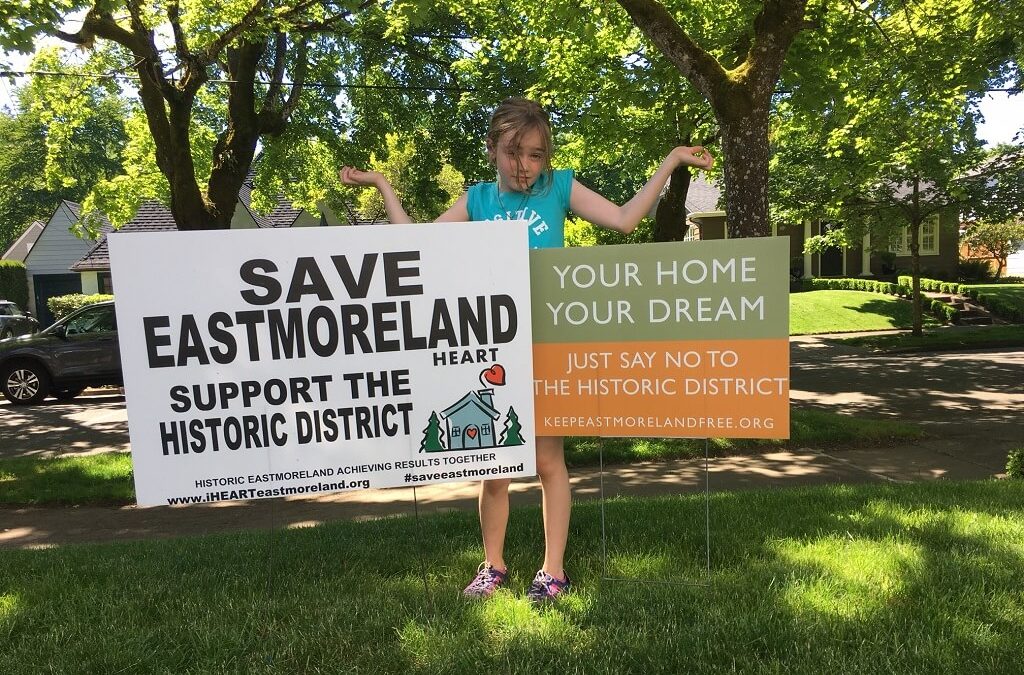Nerdletta Erdlettanay on Portland’s Affordability Crisis Amid an Epidemic of Demolitions
This week I put a face to the Nerdletta Erdlettanay name — a cover a local IT professional uses in order to freely voice her research regarding Portland’s affordability crisis. A researcher and analyst by trade, “Nerdletta’s” website Demand Affordability goes into the weeds to show how demolitions throughout Portland are unwittingly gentrifying whatever is left of Portland’s diversity, whether that be in the form of race or class.
Nerdletta’s fight for perseveration isn’t really about preserving homes, it’s about affordability. She argues that development is replacing sound, habitable and oftentimes affordable homes with more expensive dwellings. Eastmoreland aside, Nerdletta argues that developers are building for a demographic that hasn’t yet arrived, with the replacement homes priced out of reach for the majority of people that live in the affected area.
This type of redevelopment impacts the surrounding land value. Maybe this is great for homeowners looking to reap the benefits of increased land value, but according to Nerdletta, about 50 percent of Portland’s single family homes are occupied by renters. Not only does Nerdletta wonder where the displaced are supposed to go, she understands displacement to put more strain on the market — exacerbating pricing pressure — and mostly harming vulnerable communities.
According to Nerdletta, this trend is especially worrisome in Portland for two reasons:
- Oregon is the only “owner consent” state, meaning that an owner can decide if their property will be historically designated (granting protection against having a historically significant structure torn down). Nerdletta uses a Frank Lloyd Wright example: if a preservationist group wants to designate one of Lloyd Wright’s creations as “historic,” the owner can say no, therefore opening the surrounding area up to losing the piece of history through demolition. Oregon is the only state in the nation to require “owner consent” for historic designation.
- Portland doesn’t subject demolition permits to any reviews that the city could deny unless they are within a designated Historic District (HD).
Combining these two factors creates “a recipe for wholesale development.” According to Nerdletta, all you have to do is look at this Portland Maps image to see demolitions closing in on certain areas where there are protections, such as long-term home retention or HD’s. She found that more than 1,400 single family homes and duplexes were demolished in Portland over the last 5 years. Remember half of these homes may have been inhabited by renters.
*This is the cornerstone of the issue, so if you don’t have time to listen to the whole episode, skip ahead to around the 57-minute mark where Nerdletta explains that these two factors are the definition of gentrification. (Yes, these are long podcasts! I just throw some ear buds in and clean, drive or walk while listening to podcasts).
What does Eastmoreland have to do with this? Nerdletta and other experts state that HD’s are the only way we can stop the city’s demolition craze.
“HD’s put the breaks on [demolitions]. We talk about Portland being a green city and livable for everyone but if we allow the bulldozers to tear everything down, where do we draw the line? Can we just have something that says this is meaningful?” she asks.
In an attempt to preserve our housing stock, Nerdletta muses that there must be reasonable ways to restrict the demolition of sound, habitable housing. When I bring up the Residential Infill Project (RIP), Nerdletta says that RIP looks great on paper, especially as it nods to affordability, but it was supposed to be about “filling in, which isn’t what they are doing, they are tearing down.” She adds that you can fill in under an HD.
If a middle ground prohibited the demolition of sound, habitable housing — unless the reasons for that demolition met affordable housing criteria — Nerdletta firmly believes that there wouldn’t be such a need for HD’s. “Unfortunately, HD’s are the only regulatory tool that gives anyone the authority to say yes or no. Unfettered demolition isn’t good for anyone.”
She reminds us that HD’s across the U.S. look different. They’re not always about “homes being encased with amber,” she jokes. Their primary goal is to protect cultural heritage and history from being erased. “What makes traveling to Europe fantastic is that you get a sense of place and time — a visual narrative that is the collective memory of civilization.
This is Episode 3 of The Eastmoreland Project, the first series of StreetTalk, a podcast about Portland’s ever-changing communal landscape.










If people can’t sell their property to developers, how can they move to a city worth living in with their family?
Portland is the New San Francisco. Hipster creative arts and tech nerds. Many social factors why gentrification occurs and PDX and S.F. share most of the important ones. Change the factors and you stop the process but to steal the rights of property owners is immoral.
Thank you for your note Oregon Born. As property owners you have the right to sell to whomever you want. Nerdletta believes we need restrictions on demolitions after the sale takes place to developers, she thinks they don’t always need to tear down. There can even be demolitions in an HD, but she would argue that letting demo’s happen at will has a trickle down effect on those at the bottom.